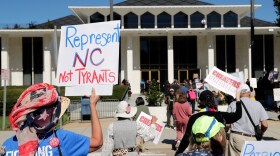In next year's midterm elections, the political slant of North Carolina's Congressional delegation and state legislature could hinge on a federal district court trial likely to wrap up this week in Winton Salem. Two consolidated lawsuits claim that GOP legislators drew district maps to purposely dilute the voting power of Black communities in certain parts of the state.
GOP state lawmakers redrew the challenged maps in 2023 after the state Supreme Court, with a majority of conservative justices that took over after the 2022 elections, reversed a previous high court decision. That earlier decision had found Republican legislators violated the state Constitution by drawing maps skewed by excessive partisanship.
Last year, those redrawn maps helped Republicans retain majorities in both chambers of the state legislature and changed the North Carolina Congressional delegation from a 7-7 split to a 10-4 GOP tilt.
Challenged maps contain an "awkward notch"
"We see this as yet another example of racially discriminatory, gerrymandered maps that harm minority voters for the intentional purpose of strengthening the majority party's numbers both in the legislature and Congress," said Bob Phillips, executive director of Common Cause North Carolina, one of the plaintiffs.
The lawsuits allege GOP lawmakers devised voting districts that broke up and dispersed blocs of Black voters in the Triad cities of Greensboro, High Point, and Winston Salem; in a northeastern, rural part of the state known as the Black Belt; and in the New Hanover County city of Wilmington. The lawmakers then allegedly attached districts with high concentrations of Black voters to more conservative leaning areas. In redistricting parlance, it's a practice called "cracking."
For example, Phillips pointed out, in Wilmington, the GOP map makers took a part of downtown with a significant population of African-American voters, carved it away from other demographically similar New Hanover County areas--forming what one of the lawsuits described as "an awkward notch, resembling the head of a giraffe"--and attached it to a voting district with the more Republican-leaning Brunswick and Columbus counties.
"So, it is a very peculiar manipulation of the maps that is clearly weakening the voting strength of Black voters in downtown Wilmington," Phillips said.
Defendants say they relied on partisanship, not race
If the plaintiffs prevail, then the three-judge panel considering the case could find that GOP lawmakers violated minority protections under the federal Voting Rights Act in addition to provisions of the U.S. Constitution. The panel is made up of three judges nominated by Republican presidents: Richard Myers and Allison Rushing, tapped by Pres. Donald Trump; Thomas Schroeder, by Pres. George W. Bush.
But the Republican legislative defendants have maintained they relied on traditional redistricting criteria in making up the maps and that the plans stay within the bounds of acceptable partisan considerations.
"This disentangling of partisanship and race, whether it's possible, whether the court is buying it, that's really the crux of both these arguments in a legal sense," said Professor Chris Cooper, director of Western Carolina University's Haire Institute for Public Policy and author of "Anatomy of a Purple State: A North Carolina Politics Primer."
On the one hand, Cooper explained, you have the plaintiffs arguing that while in recent years the U.S. Supreme Court has weakened the Voting Rights Act, protections for minority communities still matter and must be upheld against GOP efforts to draw racially discriminatory district lines.
Cooper continued: "And the defendants are saying, 'No, we didn't do that at all, we discriminated based on partisanship and, by the way, we're allowed to do that.'"
No matter the outcome of the federal district court trial, an appeal is all but guaranteed. Should new maps be ordered, they would have to be completed before the start of candidate filing in December.







